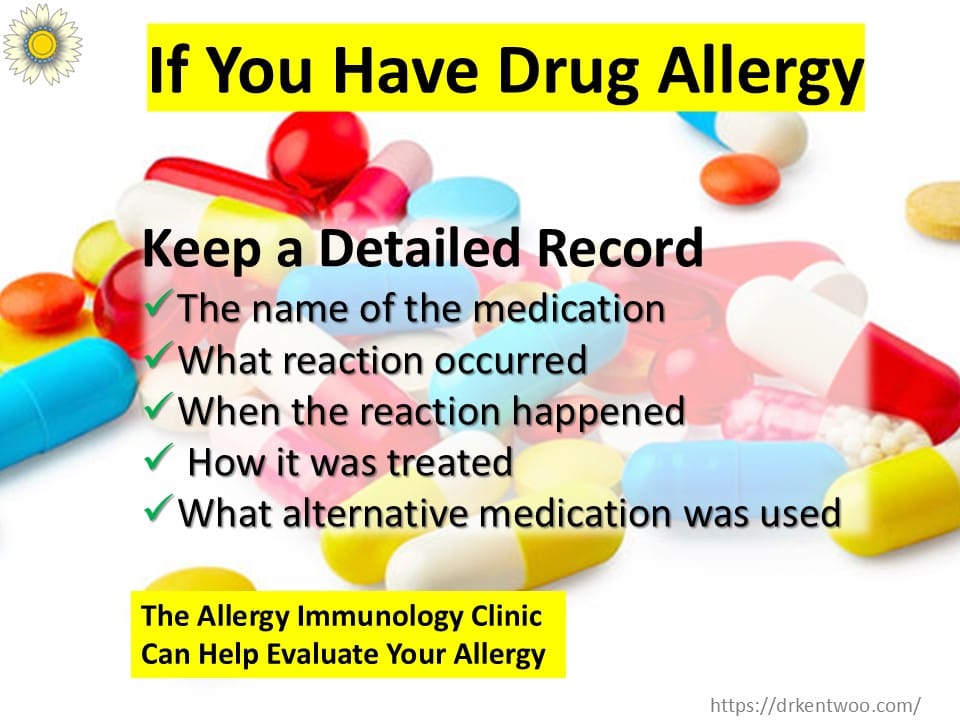Think You Have a Medication Allergy? Here’s What You Need to Do
🚨 Myth: If you have a drug allergy, your doctor can do a quick test to find out what you’re allergic to and what you can safely take.
✅ Truth: There is no simple test for all medication allergies!
Drug allergy evaluation requires a thorough medical history, specialized testing, and expert analysis by an Allergist/Immunologist. If you suspect a medication allergy, here’s what you should do to ensure accurate diagnosis and safe treatment options.
Step 1: Keep a Detailed Record of Your Allergy History
Over time, it’s easy to forget the details of an allergic reaction. Keeping a written record will help your doctor accurately assess your allergy.
📝 What to write down:
✔ The name of the medication – Don’t rely on memory; write it down!
✔ What reaction occurred – Rash? Swelling? Breathing issues? Anaphylaxis?
✔ When the reaction happened – Minutes, hours, or days after taking the drug?
✔ How it was treated – Did you need antihistamines, steroids, or emergency care?
✔ What alternative medication was given – This helps identify safe drug options.
💡 Why is this important?
Many drug reactions are not true allergies—some are side effects or temporary sensitivities. Accurate information helps determine whether you need testing or if the drug can be safely used again.
Step 2: Identify the Likely Culprit
🔍 Did you take multiple medications at the same time?
If yes, it’s critical to note:
🕒 Which medications were taken first?
🕒 Which ones were newly introduced?
🕒 Did you have a similar reaction before?
Knowing this timeline of events helps your Allergist/Immunologist pinpoint the most likely culprit and avoid unnecessary drug restrictions.
Step 3: Get Evaluated by an Allergist/Immunologist
📌 Many people are mistakenly labeled as allergic to medications when they actually aren’t!
If you have been diagnosed with a drug allergy, it’s essential to see a specialist for an accurate evaluation.
👩⚕️ Why?
- Many drug allergies fade over time, meaning you may no longer be allergic.
- Avoiding certain medications unnecessarily can lead to less effective treatment options.
- If you have a suspected antibiotic allergy, testing can help remove incorrect labels and allow for safer, more effective antibiotic use.
💡 Don’t wait until the last minute! Drug allergy evaluation takes time—it’s not something that can be done in just a few minutes. Schedule an appointment with an Allergist/Immunologist as soon as possible.
How Drug Allergy is Evaluated
🚨 Another common myth: Drug allergy testing is quick and easy.
✅ Truth: Proper drug allergy evaluation takes time and is done in multiple steps.
Click here to Learn more about → Drug Allergy Testing
Final Takeaway: Be Proactive About Your Medication Allergies

✅ Keep a detailed record of past drug reactions.
✅ Communicate clearly with your doctor about symptoms and medication history.
✅ See an Allergist/Immunologist to get properly tested and avoid unnecessary drug restrictions.
✅ Don’t assume you’re allergic forever—many medication allergies fade over time!
📅 Think you have a drug allergy? Schedule an appointment today!





